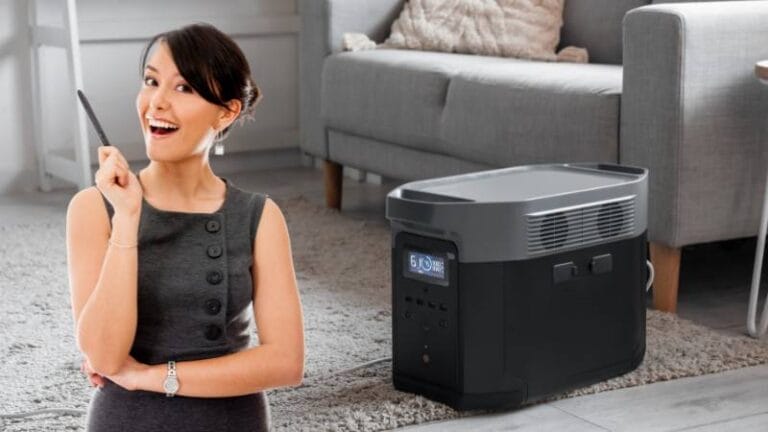So, let me guess, you’re considering investing in a solar generator for your home. And you’re scratching your head over that big question in mind — “Can a solar generator power a house?”
The answer is ‘Yes,’ but it’s not as simple as that. You’ll need to consider some specific technical aspects, and that’s exactly what we’re going to dive into today.
In this blog post, we will explore the capabilities of solar generators and provide guidance on how to choose the best solar generator system for your home.
Let’s uncover the truth about solar generators for houses and their potential to power your house.
Key Takeaways
- Solar generators can power your entire house, given that their battery capacity matches your house power consumption.
- Solar generator systems come in two main types: standalone and grid-tied. Each provides different benefits that should be considered when selecting the right system.
- Factors such as budget, expandability options, size of solar panel, and efficiency must be taken into account to make an informed decision on the best solar generator for homes.
Can a Solar Generator Power a House?
Yes, a solar generator can power your entire house. But you need to calculate the average power consumption of your house and install a solar power station that can match the wattage requirement.
At the same time, you must consider the geographical location of your house, as a solar power system is very dependent on the amount of sunlight it gets.
Basically, whole-house solar generators, equipped with the necessary power output, are capable of fulfilling the energy needs of a home. However, a portable solar generator may lack the wattage capacity to power large appliances and might not be able to power multiple appliances simultaneously.
Nevertheless, the best solar generators in the market can provide backup power during power outages, emergencies, or even supplement traditional grid power sources with solar power. This helps reduce reliance on non-renewable energy sources and contributes to a greener environment.
So, the answer to the question of whether a solar generator can power a house is both yes and no, depending on the size and capacity of the solar generator and the energy requirements of the home.
Factors Affecting Solar Generator Efficiency
It’s important to remember solar generators’ efficiency can be impacted by several factors. But two critical factors play major roles here,
- Amount of sunlight
- Battery efficiency
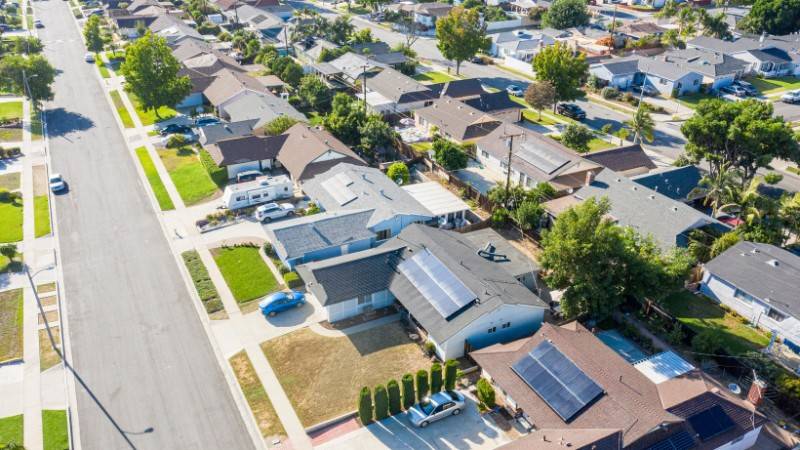
The amount of direct sunlight exposure your panels get is crucial, and so are local weather conditions — overcast skies can significantly lower power output.
For example, the average hours of full sun per day in Wisconsin is 3 hours, 56 minutes. On the other hand, the average sun hours per day in Arizona is 12 hours.
So clearly, a solar power system in Arizona will be more efficient than one in Wisconsin.
Moreover, battery efficiency plays a significant role as not all the energy captured by your panels ends up stored for use. So, it’s crucial that you get your solar batteries from a reputable brand.
Powering Essential Appliances
During a power outage, solar backup generators can step in and provide electricity for essential appliances, such as lights, fans, and computers. The key is to choose a solar generator with an appropriate inverter capacity and battery storage to meet the energy demands of these appliances.
A solar generator with expandable battery capacity is advantageous, as it allows homeowners to adjust the backup capacity according to their changing power requirements. Knowing the power consumption of your appliances and devices will help you choose the right solar generator to keep your home running smoothly during emergencies.
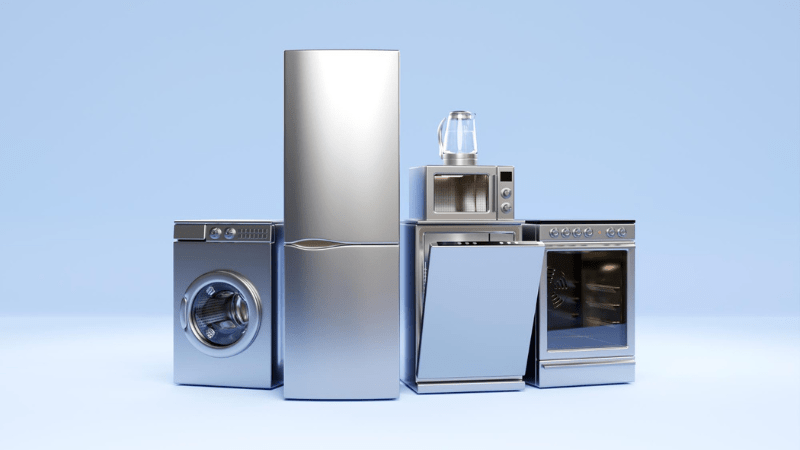
Supplementing Traditional Power Sources
In addition to providing backup power during outages, solar generators can also supplement traditional grid power, reducing energy costs and increasing self-sufficiency. Grid-tied solar generators, connected to a home’s electrical system, can provide backup power in the event of outages and help lower electricity bills by utilizing the sun’s energy during peak hours.
This not only saves money, but also contributes to a cleaner environment by reducing reliance on non-renewable energy sources.
What Size Solar Generator Do You Need To Power Your House?
Before we delve into whether a solar generator can power your house, we need to understand what ‘powering a house’ truly means. This involves taking a look at how much energy a typical home uses.
It’s important to know that energy consumption can greatly vary based on the location and lifestyle of a household.
Here’s a table illustrating the average household energy consumption by different countries.
| Country | Average Household Energy Consumption (kWh/year) |
|---|---|
| USA | 11,156 |
| Canada | 11,305 |
| Australia | 5,919 |
| Japan | 4,749 |
| UK | 3,658 |
| India | 1,005 |
Based on the table above, if you live in the US, your whole-house solar generator needs to offer 30kWh/day.

Read More:
How To Calculate Your Home’s Power Consumption?
Before investing in a solar generator system, it’s essential to accurately estimate your home’s power consumption and size the solar generator system accordingly.
First, let’s calculate your home’s power consumption and determine the appropriate size of a solar generator system to meet your specific energy needs.
To begin, you will need to calculate the total wattage of all the appliances and devices you plan to power with the solar generator system. This includes lights, refrigerators, air conditioners, and any other electrical devices. Once you have determined your goals, you will be able to make them.
The following table illustrates the power consumption of various household appliances and devices commonly found in the USA.
| Appliance | Average Power Consumption (Watts) |
|---|---|
| Central Air Conditioner (2.5 ton) | 3,500 |
| Clothes Dryer | 2,000 |
| Refrigerator (20 cu. ft.) | 150 |
| Phone Charger | 25 |
| Desktop Computer & Monitor | 300 |
| Microwave | 1,000 |
| Light Bulb (LED) | 8-12 |
| Ceiling Fan | 25-75 |
| 42" LED TV | 120 |
| Dishwasher | 1500 |
Remember, these values are average estimates. The exact power consumption of your appliances may differ based on their specific models and how they are used.
You can also check this chart to identify the power hungry appliances in your household.
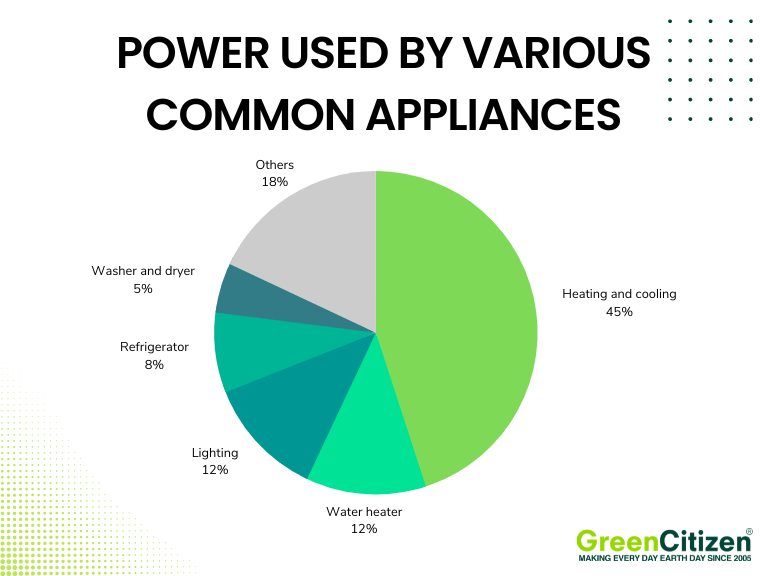
Sizing Solar Generator Systems
Once you have estimated your home’s power consumption, you can determine the appropriate size of a solar generator system to meet your energy needs. This involves considering factors such as the size and capacity of the solar panels, the charge controller, and the inverter, as well as the amount of sunlight available in your location.
By taking these factors into account, you can choose a solar generator system that will provide enough power to keep your home running smoothly and efficiently.
Types of Solar Generators for Home
There are two main types of solar generators typically used in residential settings: standalone and grid-tied solar generators. Standalone solar generators are portable and can power small appliances and devices independently.
Grid-tied solar generators are connected to the home’s electrical system and can provide backup power during outages. Understanding the differences between these two types of solar generators will help you make an informed decision when choosing the right solar generator system for your home.
Standalone Solar Generators
Standalone solar generators, also known as portable power stations, are portable devices capable of independently powering small appliances and devices using portable solar panels.
These generators are often used in off-grid situations, such as camping trips, RVs, or remote cabins. They can also serve as a backup power source for essential appliances during power outages in residential homes. A perfect example of such standalone one would be Bluetti AC200P.
However, it is crucial to choose a standalone solar generator with sufficient power output and battery capacity to meet your specific energy needs. This means considering the wattage of the generator, the battery capacity, and the number of outlets available. Additionally, it is important to consider the size and weight of the generator.
Grid-Tied Solar Generators
Grid-tied solar generators are connected to a home’s electrical system and can provide backup power during outages. These generators are more suitable for homes that rely on the electrical grid for their primary power source.
In addition to providing backup power, grid-tied solar generators can also lower electricity bills and may be eligible for government incentives. Tesla Powerwall is a good example of such generator.
However, they require a connection to the electrical grid, which may not be suitable for more isolated areas. Grid-tied solar generators are an ideal choice for homeowners seeking to minimize their electricity costs and maintain access to emergency power during power outages.
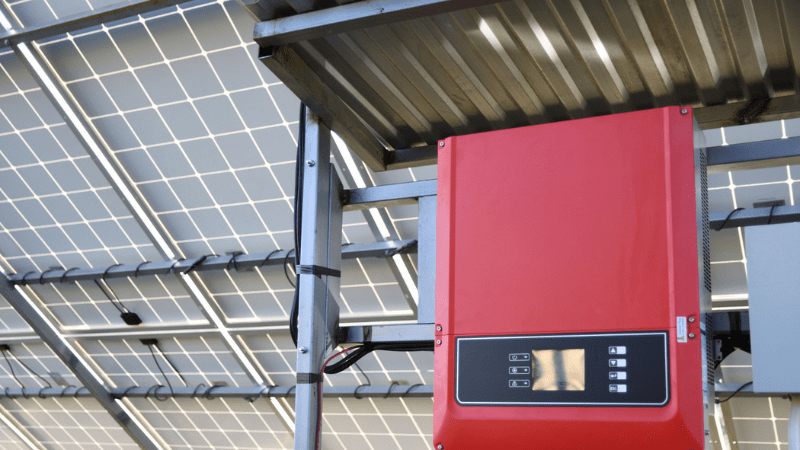
Components and Functionality of Whole-House Solar Generators
A solar generator system is comprised of four main components: solar panels, a charge controller, an inverter, and battery storage. Each component plays a crucial role in capturing sunlight, converting it into electricity, and storing it for later use.
Understanding the functionality of these components will help you better grasp how solar generators work and enable you to make informed decisions when choosing the right solar generator system for your home.
1. Solar Panels
Solar panels are essential components of a solar generator system, responsible for capturing sunlight and converting it into electricity. The efficiency of solar panels can vary, but advancements in technology have led to higher efficiency ratings in recent years.
It’s important to consider the size solar generator and the efficiency of the solar panels when choosing a solar generator system, as this will directly impact the amount of electricity generated and stored in the battery.
2. Charge Controller
The charge controller in a solar generator system serves to regulate the amount of energy that is transferred from the solar panel to the battery, preventing overcharging and prolonging battery life. In the event of low battery power, the charge controller will automatically disconnect the load to protect the battery from damage.
Choosing a solar generator system with a high-quality charge controller will ensure efficient charging and discharging of the battery, contributing to the overall performance and longevity of the system.
3. Inverter
An inverter is a critical component in a solar generator system, as it converts the direct current (DC) electricity generated by the solar panels into alternating current (AC) electricity, which is compatible with the electrical grid and most household appliances.
The inverter rating, which denotes the maximum power output of the generator at any given time, should be considered when choosing a solar generator system. A higher inverter rating will allow for more devices and appliances to be powered simultaneously.
4. Battery Storage
Battery storage is a crucial aspect of a solar generator system, as it stores the electricity generated by the solar panels for future use. Most solar generators currently on the market utilize lithium-ion batteries, which offer higher energy density and longer cycle life compared to traditional lead-acid batteries.
When choosing a solar generator system, consider the battery capacity, which determines the amount of energy that can be stored and the duration of operation for your appliances and devices.
Solar Generator Running Time and Reliability
The running time and reliability of a solar generator are crucial factors to consider when choosing a solar generator system for your home. Various factors, such as charging and discharging rates and weather conditions, can affect the performance and longevity of a solar generator.
In the following sections, we will explore these factors and discuss their impact on the running time and reliability of a solar generator system.
Charging and Discharging Rates
Charging and discharging rates are essential factors that affect the performance and durability of a solar generator system. A higher charging rate accelerates the battery charging time, while a higher discharging rate expedites the battery discharging time. Moreover, a higher charging and discharging rate can prolong the battery life.
When selecting a solar generator system, it’s crucial to consider the charging and discharging rates to ensure efficient performance and longevity of the system.
Weather Conditions and Location
Weather conditions and geographic location can significantly impact the efficiency and effectiveness of a solar generator system. Cold temperatures can allow solar panels to produce more voltage, resulting in increased electricity output, while high temperatures can reduce the power output of the PV cells due to voltage reduction. Additionally, clouds can reduce the amount of direct sunlight that reaches solar panels, decreasing the efficiency of the solar energy system.
When choosing a solar generator system, it’s essential to consider the specific weather conditions and location of your home to ensure optimal performance.
Comparing Solar Generators with Gas Generators
When considering a generator for your home, it’s essential to weigh the pros and cons of solar generators versus gas generators. Solar generators have several advantages over their gas counterparts, such as higher energy efficiency, reduced environmental impact, lower noise levels, and less maintenance.
In the following sections, we will delve deeper into these comparisons to help you make an informed decision on the best generator type for your home.
Efficiency and Environmental Impact
Solar generators boast higher energy efficiency and a reduced environmental footprint compared to gas generators. While the efficiency of solar panels can vary, some models have efficiency ratings of up to 23% or higher. Solar generators produce no emissions, making them an excellent option for reducing one’s carbon footprint and contributing to a cleaner environment.
In contrast, gas generators rely on non-renewable fossil fuels and produce harmful emissions, making them less environmentally friendly.
Noise Levels and Maintenance
Solar generators are generally much quieter than gas generators, with only a slight buzzing from the inverter and noise from the cooling fans. This can be a significant advantage in residential settings, where noise can be a disturbance to you and your neighbors.
In terms of maintenance, solar generators require minimal upkeep (such as cleaning the solar panels and assessing the battery levels) compared to gas generators, which necessitate regular maintenance like changing the oil and spark plugs. By choosing a solar generator, you can enjoy a quieter, more eco-friendly, and low-maintenance power source for your home.

Read More:
Frequently Asked Questions (FAQ)
Yes, it is possible to use a solar generator to power an entire house. Solar generators require sufficient solar panels and battery storage to be able to generate and store enough energy for your home’s power needs. Additionally, you will need an inverter to convert the stored solar energy into usable electricity.
Yes, it is possible to use a solar generator to power an air conditioning unit. With the right size generator and appropriate setup, you can effectively keep your home cool with solar energy.
Yes, you can certainly live off the grid with a solar generator. Solar generators offer an alternative to traditional electrical sources, providing clean energy that is renewable and inexpensive. They can power all of your daily needs, such as cooking, lighting, and running household appliances.
No, a solar generator cannot run all the time. While they are incredibly useful in power outages and other emergency situations, solar generators need to be recharged regularly to maintain their function and battery life. Therefore, they can only provide short-term reliable power during an outage or emergency.
A solar generator is an efficient way to convert sunlight into usable electricity. It typically includes a set of solar panels, a battery, a charge controller, and an inverter that converts the stored energy into AC power.
Conclusion
So, to answer our initial question, “Can a solar generator power your house?” Yes, it can but as we’ve explored, it’s not a one-size-fits-all solution. The effectiveness of a solar generator will depend heavily on your household’s energy needs, the climate in your area, and the specific features of the generator you choose.
I hope this guide has shed some light (pun intended!) on solar generators and how they can power your home. And remember, by considering a solar generator, you’re not only potentially saving money in the long run but also contributing to a more sustainable and energy-efficient future.
So, what’s your take? Do you think a solar generator might be a good fit for your home? Or perhaps you’ve already got one, and have some insights to share? Either way, I’d love to hear your thoughts, so feel free to drop a comment below. And as always, if you have any questions or need further clarification, don’t hesitate to ask.
Let’s all do our part in lighting up our homes with the power of the sun. Here’s to a greener, brighter future!
